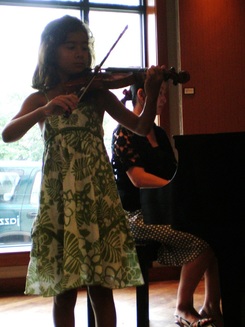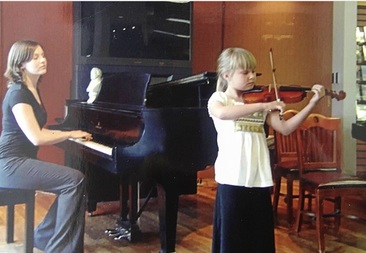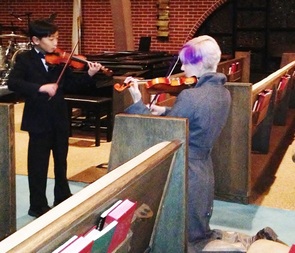On this page is information on:
- Expectations for parent, teacher, and students
- Information for beginning students
- Recitals
- Instrument policies, and more.
Q. How much do you charge?
A. Rates and schedules are found on the Tuition and Schedule page.
Q. How long are lessons?
A. Between 30 and 60 minutes, depending on the age and level of the student.
Q. How much are students required to practice?
A. This also depends on the age and level of the student. In general, it's best to practice a little each day than fewer sessions of cramming.
What do my child and I need to do?
Expectations for the lessons:

Teacher:
-Be qualified to teach any materials the student receives.
-Prepare in advance for all lessons.
-Assign materials and clearly communicate expectations and goals.
-Balance short and long-term developmental goals.
-Decide on pace of study. In the early stages, the pace will be more deliberate as fundamentals are stressed and established.
-Suggest practice strategies in support of all assignments.
-Keep personal notes for all students and chart individual progress.
-Provide performance opportunities in classes and studio recitals.
Parents:
For younger students:
-Attend all lessons and take detailed notes so as to be an effective home teacher. The parent who will be practicing with the child that week should be the one attending lessons.
-Maintain One Teacher at a Time. However tempting it may be to remind your child of something you worked on at home but seems to be forgotten now, this can be humiliating for the child and can disrupt the flow of the lesson. I promise I have noticed the problem, but am waiting for an appropriate time to address it.
-Play the recordings daily. Make sure the CD is available at all opportunities that might arise (carpool, playtime, bedtime, waiting rooms).
-Organize the home practice and set aside daily time for that purpose. Practice should be part of a regular routine, like tooth brushing. Practice can be broken up in intervals throughout the day.
-Have a realistic expectation of progress and instill in the child that consistent effort, cooperation, attitude are more valuable than immediate results. (secret for adults: those results will come with effort and a good attitude!)
-Commit to study for at least one year. I start most beginners quite slowly so that the fundamental techniques can be established. When these are mastered, the pace and difficulty level will accelerate.
All students:
-Be positive, encouraging, excited about small achievements, never sarcastic or humiliating. Try to make a positive attitude one of the skills to practice for you and your child!
-Arrive 5 minutes before the lesson so that your child can go to the bathroom, unpack, get a drink of water, etc., so that the lesson may begin on time.
-Try to attend all student recital performances, whether or not your child will be performing. If your child is performing, please stay the duration of the recital to support your peers.
-Pay tuition on time and in full as agreed upon with the teacher.
-When possible, attend solo performances given by the teacher. Attend lots of performances! Be exposed to great music!
-Maintain instrument in good condition at all times and purchase/rent supplies promptly.
Student:
-Young students
-Cooperate with teacher and parent during lessons and home practice.
-Wash hands, trim nails, go to the bathroom, get a drink before daily practice time and lesson time.
-Treat parents, teachers, and peers with respect.
-Listen to recordings daily.
-Attend and participate in group lessons and recitals.
-Bring all necessary materials to all lessons.
Older students
-Be prepared for all assignments at all lessons. Your practice guidelines will be laid out for you in your lessons.
-Show up on time and with all required materials for lessons, master classes and performances.
-Be a role model for younger students in behavior, attitude, commitment and attire.
What will the first months look like? Beginning Students

Beginning students aged 5 and under will not use a real violin for some time. To start, they will be using a pretend violin and bow while their hands and arms learn the proper position. They will also learn the care and parts of their violin. When ready, I will guide you through the process of getting a real violin, usually a time of great accomplishment and joy!
Parents and children are encouraged to observe lessons of current students.
Begining parents are also required to attend:
Parent Education:
Parent education classes are required for parents of beginners and recommended for all other parents. Often, they will take the place of regular lessons for the first few lessons. Parents will learn what my expectations of them will be, what their expectations of their child should be, and Suzuki philosophy. This will help the parent become an effective home teacher, and to get the most out of lessons with their child.
****Parents will also learn to play Twinkle Twinkle Little Star on an adult-sized violin in preparation for practicing with their own children. Parents will perform this at their first recital!
Materials to bring to the first Parent Ed class are:
-Suzuki volume one, book and CD
-Full size violin and bow, rented for one month
-Kun Shoulder rest - Depending on availability, I may lend you one.
-Ability Development from Age Zero by Shinichi Suzuki
-a notebook and pen/pencil
-a tote bag or some other way of keeping violin materials together
Most of these items are available from:
Robertson and Sons Violin Shop in Albuquerque. Their phone number is (505) 889-2999, or 1-(800) A VIOLIN.
Reeve Violins in the Santa Fe Arts District
Kolacny's on South Broadway.
Rick Molzer (SE Aurora) and Von's violins shop (E. Hampden) also rent quality instruments.
Parents and children are encouraged to observe lessons of current students.
Begining parents are also required to attend:
Parent Education:
Parent education classes are required for parents of beginners and recommended for all other parents. Often, they will take the place of regular lessons for the first few lessons. Parents will learn what my expectations of them will be, what their expectations of their child should be, and Suzuki philosophy. This will help the parent become an effective home teacher, and to get the most out of lessons with their child.
****Parents will also learn to play Twinkle Twinkle Little Star on an adult-sized violin in preparation for practicing with their own children. Parents will perform this at their first recital!
Materials to bring to the first Parent Ed class are:
-Suzuki volume one, book and CD
-Full size violin and bow, rented for one month
-Kun Shoulder rest - Depending on availability, I may lend you one.
-Ability Development from Age Zero by Shinichi Suzuki
-a notebook and pen/pencil
-a tote bag or some other way of keeping violin materials together
Most of these items are available from:
Robertson and Sons Violin Shop in Albuquerque. Their phone number is (505) 889-2999, or 1-(800) A VIOLIN.
Reeve Violins in the Santa Fe Arts District
Kolacny's on South Broadway.
Rick Molzer (SE Aurora) and Von's violins shop (E. Hampden) also rent quality instruments.
Will we get to perform?
Recital information

-Recitals are held around 5 times each year. Students who have pieces that are polished for the level of the student played will be asked to play in the recitals. Because it can take a long time to polish new pieces, each student will not play on every recital, but are encouraged to come and listen anyway. Although each student probably will not play on every recital, most students do play fairly consistently. It is valuable to hear players at different levels playing pieces that the students will someday be working on. It is also good experience to hear pieces the student has already worked on and realize how far he/she's come. I encourage a supportive atmosphere in my studio where students come to hear their friends play pieces on which they have worked very hard.
Outside rehearsals for the recital will require payment to the accompanist. This is typical for students Suzuki book 4 and above. There is a separate recital fee for all students regardless of level.
Dress for the recitals is semi-formal, with no jeans, flip-flops, or sneakers.
Where do I get a violin? Instruments and other policies:
I will help guide you through the search to rent or buy a violin. There are some good local options, as well as some larger businesses out of town. As tempting as it may be to get that violin that seems like such a good deal, or use Aunt Millie's old violin, a violin is a carefully crafted instrument, and using one that is substandard will affect technique and progression, and can be frustrating to the student. Periodically, students will need to move to a bigger size. When I have determined that it is time to buy or rent a first violin or move up in size from an existing violin, I will guide you through the process. A premature upsizing can cause physical problems and disrupt the student’s progress.
Outside rehearsals for the recital will require payment to the accompanist. This is typical for students Suzuki book 4 and above. There is a separate recital fee for all students regardless of level.
Dress for the recitals is semi-formal, with no jeans, flip-flops, or sneakers.
Where do I get a violin? Instruments and other policies:
I will help guide you through the search to rent or buy a violin. There are some good local options, as well as some larger businesses out of town. As tempting as it may be to get that violin that seems like such a good deal, or use Aunt Millie's old violin, a violin is a carefully crafted instrument, and using one that is substandard will affect technique and progression, and can be frustrating to the student. Periodically, students will need to move to a bigger size. When I have determined that it is time to buy or rent a first violin or move up in size from an existing violin, I will guide you through the process. A premature upsizing can cause physical problems and disrupt the student’s progress.